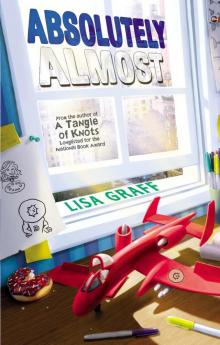- Home
- Lisa Graff
The Life and Crimes of Bernetta Wallflower Page 3
The Life and Crimes of Bernetta Wallflower Read online
Page 3
She stuck her arms over her face so all she could see was one square inch of Elsa’s ceiling and began to count by prime numbers. One, two, three, five, seven, eleven, thirteen . . .
Bernetta had always had a thing for numbers. For some reason, digits didn’t fall out of her head like history facts or grammar rules. Numbers were easy to play with, to memorize. When Bernetta saw the number 14, for instance, she didn’t just see a 1 and a 4. She saw 2 times 7, she saw 28 divided by 2, she saw the word “hi” upside down and backward. Bernetta knew numbers, their personalities, their habits, and she found them reassuring.
She’d counted only as far as twenty-three when Elsa’s door burst open and Colin raced into the room.
“BernieberniebernieberniebernieBERNIE!” he sang, buzzing around with his hands out to his sides like a glider. He came to a tumbling stop on the bed, his face just inches above Bernetta’s, and pushed out the last of the air from her cheeks with his stubby hands. “Hi, Bernie!” he squealed at her.
She squinted at him. “Don’t call me Bernie,” she said, and she snapped her eyes shut.
“Hey, Bernie, why do you have peas on your leg?”
“Because they’re cold.” Bernetta went back to counting by primes. Twenty-nine, thirty-one, thirty-seven . . .
“Ice cream’s cold too. You gonna put ice cream on your leg?”
“Forty-one,” Bernetta responded. “Forty-three, forty-seven.”
“Or frozen pizzas?”
“Fifty-three, fifty-nine.”
Colin poked her in the belly. “Bernie, Bernie, what are you doing?”
“I’m counting by prime numbers. It helps me relax. Sixty-one.”
“Oh.” Bernetta felt Colin flop down on the bed beside her. “I’m gonna relax too.”
“Sixty-seven,” Bernetta said.
“Nine,” Colin added. “Eighteen. Eleven.”
Bernetta squeezed her eyes shut tighter and tried to ignore him. “Seventy-one,” she said.
“Six.”
“Seventy-three.”
“Forty billion.”
“Seventy-nine.”
“Bubble gum.”
“Eighty-three!”
“Walla Walla, Washington.”
Bernetta opened her eyes and turned to Colin. His head was tilted to the side, and he seemed to be thinking pretty hard about something. Finally he took a deep breath and spoke. “When I grow up, I’m going to own a hot dog stand.”
Then he was out the door as fast as he’d come in. Bernetta could hear him sliding down the stairs on his butt, one thud at a time.
Bernetta resumed her counting, eyes closed: Eighty-nine, ninety-seven, one hundred and one . . . She still wasn’t feeling very relaxed.
Bernetta was interrupted again by a gentle tug on her big toe. She opened one eye.
Elsa.
“I heard about your fiasco at the club,” Elsa said with a frown. “How’s the ankle?”
Bernetta sat up, leaning on her elbows. “Purple and swollen,” she answered.
“So I see.” Elsa sat down on the edge of the bed, gingerly, so as not to disturb Bernetta’s ankle or the bag of peas.
“How was graduation this afternoon?” Bernetta asked.
Elsa shrugged. “Long robes, ugly hats. You didn’t miss a whole lot.”
“Well, I wish I could have heard your valedictorian speech.”
Elsa studied Bernetta’s face for a long moment, then leaned back and opened the top drawer of her dresser. “What color do you want?” she asked.
Bernetta thought about it. “Blue.”
Elsa rummaged around for a moment, then produced a bottle of bright blue nail polish.
Elsa was always good for a talk and toenail painting when things got tough. Back in April, when Bernetta had gotten in trouble for cheating on her history test, they’d painted their nails a new color almost every night. This time, though, Bernetta knew she was in for the talk of a lifetime. She almost wished she had more toes.
Bernetta watched as her sister shook the bottle, then unscrewed the lid and began on Bernetta’s big toe. The paint spread out across the nail in a thin blue V.
“Elsa, you know I didn’t do it, right? You believe me, don’t you?”
“Of course I believe you, Netta. You’re my sister.”
Bernetta smiled at that. “Thanks, Elsa. But—I mean—Mom and Dad. They don’t believe me, do they? If they believed me, I wouldn’t be grounded.”
Elsa was quiet for a long time, painting, dipping the brush back in the bottle every once in a while. When all the toenails on Bernetta’s right foot were blue, Elsa finally looked up.
“Look, Netta, it’s hard for them.”
“It’s hard for me too! I was framed, for Pete’s sake.”
“That’s not what I mean.” Elsa gently moved the bag of peas and started painting the toes on Bernetta’s bum foot. “They want to believe you, Netta, they do. But you have to admit there’s an awful lot of evidence against you.”
“I told you, it was Ashley. I told them that too. Why can’t they—”
“It was your PE locker, wasn’t it?”
Bernetta rolled her eyes. “But I didn’t use that locker all year! I shared with you, you know that.”
“I know that, Netta, but no one else does. And all those tests and essays that everyone was copying, they were my old assignments.”
“Ashley stole them! She was over here all the time. She could’ve easily stolen them from your room when you weren’t here.”
Elsa paused in her painting, and with her free hand she tucked a silky black curl behind her ear. Unlike Bernetta’s mess of orange-yellow cat fur, Elsa’s curls were always smooth, each one perfectly coiled like a ribbon on a birthday present. “You could’ve easily done that too, Netta,” she said.
“But I didn’t,” Bernetta replied.
“But you could have. And Ashley’s record is completely clean. Sparkling even. You said so yourself. And you cheated on that history test back in April.”
“It was Ashley’s idea. She was the one who stole the answer key.”
“And you were the one who used it. It was a stupid thing to do, Netta.”
Bernetta knew it was stupid. She’d known it was stupid even back in April. But at the time, when Ashley had suggested it, it had seemed like the only way out. No matter how hard she studied, it seemed Bernetta could never manage to pull her history grade up to an A. And if she didn’t wind up with an A in history, how was she ever going to be school valedictorian? How would she ever get her photo up on the wall in the hall of honors, right next to Elsa’s, the two Wallflower sisters smiling down on everyone for the rest of time?
“All I’m saying,” Elsa continued, working on Bernetta’s second toe, “is just give Mom and Dad some time to cool off, and they’ll come around. Lie low for a while, okay?”
“What do you mean, lie low?”
Elsa rolled her eyes. “Well, for starters, you might not want to dash out of the house the second day of your grounding while Mom’s at the grocery store, bike two miles to Dad’s dinner club, and then ruin his big number and wind up in the hospital with a twisted ankle.”
Bernetta sighed. “Yeah, okay.”
“You’re lucky you didn’t break any bones, you know.” As Elsa finished painting the last toe, Bernetta was sure she caught her chuckling.
“What?” Bernetta asked.
Elsa looked up, all smiles. “It just sounds like quite a stunt you pulled, that’s all. I’m sure it was a much better show than my speech this afternoon. I’m sorry I missed it.”
Bernetta waited until the cap was safely back on the nail polish bottle before she lobbed the pillow at her sister’s head. Elsa laughed and handed Bernetta her melting bag of peas. “Just try not to do anything crazy for a few weeks, okay?”
“Okay,” Bernetta answered. And she meant it. She really did.
4
UNDERCUT : to remove secretly one or more cards from the bottom of a deck while shuffling
Early the next morning Bernetta was sitting on the couch with her toes curled under one of the cushions, a tattered copy of The Hitchhiker’s Guide to the Galaxy resting against her legs. Normally she was a big fan of sleeping in on Sunday mornings, but her mind had been churning so hard with injustices the past two nights that she’d been finding it hard to get in her full quota of beauty sleep.
Bernetta turned the page in her book and absent-mindedly ripped off a small piece of the bottom margin of the page. Then she stuck the paper in her mouth, and while she read, she chewed. She’d been doing that for as long as she could remember. Her father always told her she shouldn’t take the phrase “devouring a good book” quite so literally, but Bernetta just ignored him. Books had a distinct flavor, a certain tang or sweetness to them, and every one was different. Older ones were saltier, newer ones thin like wafers. Her favorite books hardly had any white space left at all.
She was just getting to one of her favorite parts, where the Infinite Improbability Drive turns Ford into a penguin, when Colin appeared out of nowhere and plopped down on the couch, directly on top of Bernetta’s bad ankle.
“Hey, Bernie Bernie Bernie, how’s your foot?”
She wriggled her leg out from underneath him. “Well, two seconds ago it was feeling much better, thanks.”
“No problem,” Colin said. “Hey, can I have your shoelaces? You said you’d give me your old shoelaces if I was really nice and stopped putting tape in your hair, and I did, so you gotta.”
Bernetta noted the page she was on and closed the book. The wad of paper she was chewing was making its way toward pulp, perfect for lodging comfortably in a back molar. “Um, maybe later,” she said. “Why are you up so early anyway?”
“Watching cartoons,” he said. He leaned back into the cushions of the couch and placed his hands behind his head. His railroad pajamas rode up, exposing his six-year-old belly pudge.
Bernetta squinted one eye at him. “The TV’s not on, Semi-Colin.”
Colin didn’t seem fazed in the slightest by this news. “Cartoons aren’t on yet, duh,” he said. “It’s too early.” He continued to stare at the black screen.
Bernetta just shook her head and went back to her book. She was still reading and chewing, and Colin was still watching the blank screen, when twenty minutes later their mom came downstairs in her nubby blue robe. “What are you two early birds doing up?” she asked.
“Watching cartoons,” Colin informed her. “Saturday-morning ones.”
Their mother looked at the blank TV, then at Bernetta, as though she might be able to explain things. Bernetta just shrugged.
“But it’s Sunday,” she said at last.
“Really?” Colin frowned. “Is that true, Bernie?”
She turned a page in her book without looking up. “’Fraid so, Cauliflower,” she told him.
“Oh.” He yawned and scratched his belly. “ ’Kay, then, I’m going to sleep. Night!”
Bernetta’s mother laughed and shook her head as she watched Colin bolt up the stairs. “Well,” she said, turning back to Bernetta, “since you’re up anyway, would you like to help me with breakfast?”
Bernetta closed her book and nodded. “Sure,” she said.
“Good. I think we have a lot to talk about, don’t you?”
Talking? Bernetta gulped as her mother headed off to the kitchen, accidentally swallowing her piece of page 42.
“I have to say,” her mother began as Bernetta cracked eggs into a pan, “I was really disappointed in you yesterday. I was disappointed in your actions.”
Bernetta heaved a deep sigh. Most mothers yelled when they were angry. Hers lectured about disappointment. Bernetta thought she might have preferred the yelling. She cracked another egg as her mother continued.
“When I came home from the grocery store and I couldn’t find you . . . I can’t even tell you how worried I was.”
“I left a note,” Bernetta mumbled.
“It was irresponsible.” Her mom’s voice was sharp.
Bernetta cracked the last egg from the carton. “I know,” she said weakly.
Her mom came right up beside her then and, tucking her hand under Bernetta’s chin, took a good long look into her eyes. Bernetta couldn’t tell if she liked what she saw or not.
“Sometimes I feel like I don’t even know you anymore,” her mom said softly.
With moms who yelled, Bernetta realized, you could get mad right back. You could get defensive and shout things out and argue that whatever you’d done hadn’t really been so awful. But with moms who got disappointed—well, a mom like that just made you feel like crying, made you want to weep big baby tears right into the raw egg gunk you were scrambling up on the stove.
Bernetta blinked hard and wiped at her eyes with her wrist. “I’m sorry about last night,” she said.
Her mother nodded. “I know you are,” she said. “You’re still grounded, though. No more outings for the rest of the summer. And that includes your father’s club.”
Bernetta sighed. “Okay.”
She turned up the heat on the stove as her mother rustled through the cabinets for flour. “I talked to the principal last night,” her mom said from the depths of the cupboard.
Bernetta snapped her head up. Already? Had her fate been decided so soon? “What did he say?”
Her mom turned and looked at Bernetta. “They decided not to expel you from school.”
Bernetta jumped at that; she actually jumped, she was so excited. Raw egg flew off her spatula and splattered to the ground. “Really? Really? That’s so great, Mom!” She sped across the kitchen and gave her mother a hug, eggy spatula and all. “Oh, thank goodness I can go back! I was so worried, I—”
“Bernie.” Her mom pulled out of the hug and held Bernetta’s head with both her hands. Her gaze was definitely sad now. “Bernie, honey, listen.”
Bernetta didn’t think she wanted to. She bit her lip. “What is it?”
“Oh, honey . . . they took away your scholarship. For seventh grade. They decided not to expel you, so it won’t appear on your record, but if you want to go back next year, we have to pay full tuition. And we just can’t afford that. Especially not with Elsabelle starting college in the fall and—sweetie?”
Bernetta plopped herself down in the nearest kitchen chair, staring straight ahead at the wall. “No scholarship?” she said.
“Not anymore.”
Bernetta continued to stare at the wall. She wondered if it was possible to stare so long at something that you lost the ability to blink. She also wondered who had chosen the color of their walls—what was it, puce? She sniffled and wiped at her nose. “But that’s not fair, Mom,” she said. “They should have just expelled me then, if they wanted to. Who cares about my dumb old record anyway? It doesn’t matter what my record is if I can’t even go to a good school.”
Bernetta’s mother sat down in the chair next to her daughter and smoothed a hand over Bernetta’s frizzy orange hair. “The public school in our neighborhood is pretty good, Bernie. Your father and I were thinking—”
“I don’t want to go to that school!” Bernetta cried, swatting away her mother’s hand. “I want to go to Mount Olive.” That’s where she’d always gone. She knew the halls; she knew the teachers; she knew the students. She knew the dress code and which drinking fountain squirted you in the eye if you weren’t careful and how to make the secretary laugh so she’d give you a tardy slip even when you didn’t deserve one. “I’ll never be valedictorian,” she said in between sniffles.
“Oh, honey,” her mom said, pulling her in close. This time Bernetta let her. “You can be valedictorian of your new school.”
Maybe, Bernetta thought. But what was the point anyway? Good-bye, hall of honors. Good-bye, Wallflower sisters’ matching photos. Good-bye, everything.
“I didn’t do it, Mom,” Bernetta said. Or tried to say. Because she was weeping now, sobbing, and really all that made it out of her mouth was a hiccup. “It’s not fair.” Hiccup.
“It will all be okay, sweetie,” her mom told her, rocking her the way she used to rock Colin when he was a baby. “Somehow things always work out in the end.”
As Bernetta let herself be rocked, she thought about that. Somehow things always work out. That couldn’t possibly be true. Because if things always worked out, she wouldn’t have worked herself into a fake friendship with a conniving criminal named Ashley Johansson. And she wouldn’t be sitting in her kitchen right now, learning that a school board full of stuffy suits had decided she wasn’t good enough for their school anymore. No, things didn’t always work out.
“Mom?”
“Yes, honey?”
“How much is tuition anyway?”
If you wanted things to work out, you had to do it yourself.
Her mom took in a deep breath. “Nine thousand dollars a year.”
Bernetta’s heart dropped. There was no way to work out nine thousand dollars. That was impossible.
And also, her eggs were burning.
5
CRIMP : to bend one part of a card to make it easily identifiable within a deck
“Nine thousand dollars,” Bernetta told Elsa. “Nine thousand dollars.”
“That’s a lot of money,” Elsa said. “What was it Mom wanted? Paprika and what else?”
“French bread. Elsa, you’re not even listening to me.”
They were sitting in Elsa’s car, on the way to the grocery store to pick up some last-minute dinner items for their mother. Technically, Bernetta wasn’t supposed to be out and about since she was still—and forever—grounded. But Elsa had convinced their parents that running errands wasn’t exactly a social activity and that the two of them should try to spend as much time together as possible before Elsa left for volleyball camp that week. After all, it was Elsa’s last summer before college.

 Far Away
Far Away The Life and Crimes of Bernetta Wallflower
The Life and Crimes of Bernetta Wallflower The Great Treehouse War
The Great Treehouse War A Tangle of Knots
A Tangle of Knots Sophie Simon Solves Them All
Sophie Simon Solves Them All A Clatter of Jars
A Clatter of Jars Double Dog Dare
Double Dog Dare Umbrella Summer
Umbrella Summer Absolutely Almost
Absolutely Almost Lost in the Sun
Lost in the Sun